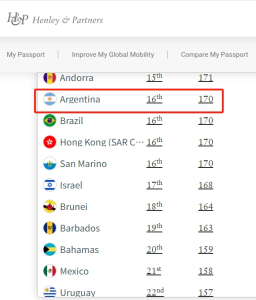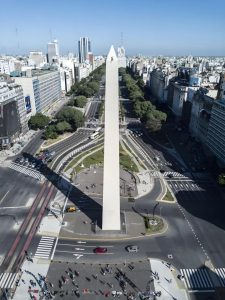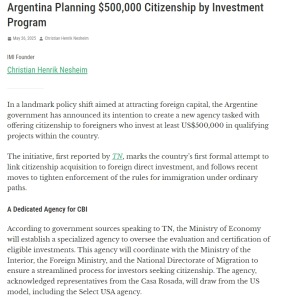Why has the Argentine passport become the new favorite for global identity?
In the global trend toward “second citizenship,” an increasing number of people are turning their attention to Argentina. This is not only because its passport offers exceptional travel freedom but also due to its flexible and efficient naturalization policies, which offer strategic potential for combining with other nationalities, such as the United States and European countries, to create multiple citizenship pathways.
This “new South American passport” not only grants travel freedom but also carries the full potential for education, asset allocation, and personal freedom.

I. A Comprehensive Overview of the Advantages of the Argentine Passport:
Multiple Guarantees of Freedom, Opportunity, and Security
1. Global Travel Freedom: A Passport’s Value Lies in Its Usability
According to the latest data from the Henley Passport Index, the Argentine passport allows visa-free or visa-on-arrival access to 170 countries and regions, ranking 16th globally.
This figure far exceeds that of most developing countries, including nearly the entire Schengen Zone in Europe, the United Kingdom, Japan, Singapore, Hong Kong, and China, which has recently opened its borders.
For example, as an Argentine passport holder, you can easily visit Germany, France, the United Kingdom, Japan, the United Arab Emirates, and even China. This “passport freedom” is truly significant.

Source: Henley & Partners
2. South American Integration: Cross-border travel with an ID card
As a member of MERCOSUR (Southern Common Market), Argentine citizens can freely enter most South American countries without a passport, using only their national ID card (DNI), and immediately enjoy the benefits of residence, work, and education.
This not only reflects regional integration but also provides tangible convenience for living and working in Latin America.
3. Education and Healthcare: A Bonus for a Superior Living Environment
Education: With passport status, there is the opportunity to enroll in top international schools in Argentina or South America, and even greater flexibility when applying to top universities in Europe and the US using dual citizenship.
Healthcare: Argentina has a relatively accessible public healthcare system, and with passport status, one can access legal and high-quality medical services locally.
Asset and Financial Planning: The passport provides the necessary identity verification for opening bank accounts abroad, facilitating asset diversification and risk mitigation.
Business and Investment Advantages: In establishing offshore structures, red chip listings, cross-border mergers and acquisitions, and real estate investments, an Argentine passport can help reduce procedural barriers.
4. Risk Mitigation and Strategy: The Psychological and Practical Value of a Second Citizenship
Argentina permits dual citizenship without requiring renunciation of the original nationality, greatly facilitating both visa-free travel and identity security.
In the current global environment where CRS information sharing is implemented across multiple countries, having an additional passport provides higher wealth security and identity isolation.
For international students and entrepreneurial families, Argentine citizenship has almost become a cost-effective “Plan B” option.

Image source: Unsplash

II. Analysis of Argentina’s Naturalization Program
Legislative Background, Process Mechanisms, and Policy Evolution
1. Advantages of Argentina’s Naturalization Program
Fast-track naturalization:
Obtain citizenship in 3 months and hold the same passport as Lionel Messi!
Visa-free access to 170 countries and regions;
Including the EU, Singapore, Hong Kong, Japan, the UK, etc., with the UK offering an 180-day ETA! The US allows application for E1/E2 visas;
Entire process handled through the official immigration bureau!
“Three No” Requirements:
No language requirements, no residency requirements, no asset origin requirements
Top choice for international students, expedited approval in 3 months;
Can open bank accounts in various countries;
Ideal option for combining/applying for third-country citizenship.
The following will provide a detailed guide to the application process.

Image source: Unsplash
2. Legal framework: The “leniency” and “efficiency” of naturalization
Argentine naturalization primarily relies on the following criteria:
Legal basis: According to the Nationality Law (Ley 346 and related regulations), applicants must be at least 18 years old, have resided legally in the country for two consecutive years prior to application, and express their intention to naturalize to a federal judge.
Lenient Conditions: No language exams, no proof of asset origin, and no strict residency requirements.
Special Exemptions: Individuals who have contributed to the nation through education, marriage, investment, business creation, or military service may be exempted from residency requirements.
Dual Nationality Protection: Most countries (except Japan) permit and retain multiple nationalities; holding an Argentine passport does not automatically result in the loss of original nationality.
3. Naturalization exemptions and family inheritance pathways
Minors who reside in the country before reaching the legal age after their parents have naturalized may automatically qualify for naturalization through a specific procedure. Additionally, marriage and family pathways also provide convenient naturalization channels.
4. Trends in immigration policy changes: tightening policies coexist with new opportunities
Policy tightening: In May 2025, Argentine President Milei issued an executive order requiring two consecutive years of residence, financial proof, and payment for health or education expenses, while strengthening deportation and expulsion oversight.
New investment pathways: Although not yet officially implemented, the potential naturalization pathway involving “investing at least 50–500 million USD” has been mentioned and is emerging as a future trend.
International Image Controversy: Due to the controversy sparked by the Russian birth tourism immigration wave, the government has strengthened entry and naturalization verification procedures.
5. Comparison with Other Countries: The Two-Year Pathway Offers Significant Advantages
Most countries worldwide require 5–10 years for naturalization, making Argentina’s two-year pathway highly competitive in terms of efficiency.
Additionally, compared to Paraguay (4 years) or European countries, Argentina is one of the fastest pathways for obtaining a second citizenship.

Source: Unsplash

III. Practical Citizenship Guide:
How to proceed clearly, steadily, and effectively?
The following guidelines are compiled based on official policies and successful cases, and are highly recommended for prospective applicants:
Step 1: Prepare documents and undergo background checks (approximately 1 week)
Full passport scan;
Criminal record certificate (within the past 2 years, notarized + Hague Apostille);
Birth certificate (notarized + Hague Apostille);
If following an exemption pathway (e.g., marriage, investment, educational contributions), provide supporting documentation.
Ensure all documents are consistent, free of errors, and undergo the certification process.
Step 2: Visa Application and Temporary Residence (15–40 days)
Submit an electronic visa application (approximately 15 days for approval) or a traditional visa application (approximately 40 days) based on your actual choice.
After the background check is approved, you may enter the country and obtain a temporary residence permit.
Step 3: Arrival Arrangements and First Fingerprinting (within a few days of arrival)
Sign the lease agreement and move in on the day of arrival;
On the following day, undergo the first fingerprinting process and initiate the application process for the criminal record certificate and address proof.
Step 4: Submission for Review (within 1 week)
Address and criminal record certificates will be obtained in approximately 1 week;
Documents are submitted to the Supreme Court to initiate the naturalization approval process.
Step 5: Approval Process (1.5–2 months)
The court issues an electronic approval after review;
You may proceed to the Ministry of the Interior for a second fingerprint registration.
Step 6: Collection of ID Card and Passport (approximately 4–6 weeks)
After the second fingerprinting, you will receive a receipt and can track the progress online;
The ID card will be issued in approximately 3–4 weeks;
The passport will be issued in just 2 working days.
Total processing time: From preparing the documents to receiving the passport, the ideal process takes 4–6 months. Compared to the years of waiting required by other countries, this efficiency is highly attractive.
Case reference:
Our client Reddit shared their application experience as follows:
“I applied through my mother, who was born in Argentina. After preparing the birth certificate, DNI, and passport translations with notarization, I applied at the consulate… I received the DNI after a few weeks, then waited another two to three months for the passport.”
This demonstrates that the efficiency of the process depends on proper document preparation and adherence to procedures, and validates the feasibility of the official pathway.

↑Stock image, remove if infringing

4. Argentina’s 500,000 USD Citizenship Program
To attract foreign investment, the Argentine government has introduced a landmark policy reform, establishing a dedicated agency to allow foreigners who have completed eligible investments (estimated at least 500,000 USD) within Argentina to apply for citizenship.
According to the latest presidential decree on May 14, the Argentine Immigration Bureau announced that it will increase the naturalization application fee from 300,000 USD to 500,000 USD, a 67% increase! This adjustment will take effect immediately upon the policy’s official implementation. More critically, the new policy simultaneously introduces a “major investment naturalization” mechanism, which may require higher investment thresholds in the future, while the current pathway may soon close!
According to Argentina’s official Decree No. 524/2025, investors may apply for citizenship through Argentina’s “Investment Citizenship Program.” The program is administered by the “Investment Citizenship Program Specialized Agency” under the Ministry of Economy, which reviews applications and assesses whether the investment meets the “significant investment” criteria.

Source: imidaily
The review process is as follows:
After submitting an application, the specialized agency will verify whether the investment meets the Ministry of Economy’s “significant investment” criteria.
If preliminarily approved, the agency will seek security review opinions from multiple government departments, including the Ministry of Security, the Financial Intelligence Unit (UIF), the National Recidivism Registry, the National Population Registry (RENAPER), the Intelligence Agency (SIDE), and other necessary entities, to ensure that the citizenship application does not compromise national security or public interest.
After compiling the review results, the specialized agency will prepare a review report and submit it to the Argentine National Immigration Agency (Dirección Nacional de Migraciones). The Immigration Agency must make a formal decision on whether to approve the naturalization within 30 working days of receiving the application and provide a written explanation.
This arrangement marks Argentina’s first time linking citizenship to foreign direct investment, while also breaking the previous requirement of at least two consecutive years of residence, providing overseas investors with a more convenient path to naturalization.

Source: imidaily
Global Perspective: Argentina, the “Passport Freedom” You Deserve
The Argentine passport has emerged as a “practical option” for international individuals due to its travel freedom, educational and asset advantages, regional convenience, and dual nationality policy. Its two-year naturalization pathway is efficient and considerate, making it one of the most cost-effective second citizenship options globally.
However, it is important to monitor policy trends, such as Javier Milei’s potential tightening of naturalization requirements, the possible launch of an investment-based naturalization program, and public scrutiny over the misuse of citizenship. Careful planning and cautious execution are essential to ensure successful implementation and the legal validity of your citizenship.
Whether you are seeking global travel freedom, laying the groundwork for your children’s international education, or pursuing wealth isolation and strategic planning, Argentine citizenship could be a key piece of your life’s puzzle. We hope this article illuminates your path, and we welcome sharing and forwarding it to help more people discover this practical and meaningful opportunity.
Note: Reference materials are sourced from Argentina’s SNM, Juzgado Federal, UIF, iProfessional, Henley & Partners, imidaily, and comprehensive public news reports. Reproduction requires attribution; please contact us for removal if necessary…..
